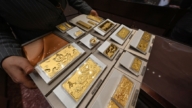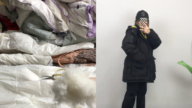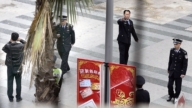【新唐人2013年08月09日讯】近年来,中国大陆很多贪官和商人纷纷想尽办法将钱财转移国外,掀起一股投资与收购境外资产的热潮。最近法国反洗钱部门指出,中国人收购了法国越来越多的葡萄园,但许多迹象显示:这些买主可能是在利用收购葡萄园来洗钱和掩盖罪行。下面请看报导。
法国“经济财政部”下属的反洗钱机构Tracfin(Traitement du Renseignement et Action contre les Circuits FINanciers clandestins,非法金融资本流动信息收集和处理,下称Tracfin)近期公布的2012年调查报告显示,法国葡萄园的买主中与中国有关联的人越来越多。有些买主作了复杂的交易安排,通过一系列投资公司来购买葡萄园,使得法国政府难以确认资金的来源及合法性。因此,反洗钱机构敦促法国当局对购买葡萄园的中国买主提高警惕。
美国南卡罗莱纳大学“艾肯商学院”教授谢田:“法国政府的这个调查揭开了一个很好的迷,就是说,我们可能不能排除这些所谓的收购,实质上是一种洗钱,实质上是中共的贪官把贪污腐败得来的钱合法化的一个过程。”
在大陆,多年前出现了一个新的行业,那就是为贪官转移不法收入,从中赚取高额服务费。有大陆民间投资顾问对《新唐人》表示,自己接触的人中,就有人在帮助一些财团和所谓的“达官贵人”洗钱。
大陆民间经济学家郑先生:“不管是买葡萄园也好,在海外采购、进行什么(商业活动)也好,这些事情不是今天才有。而是他们一直悄悄进行好多年了。”
致力于减少发展中国家不法来源收入的华盛顿研究机构“全球金融诚信”(Global Financial Integrity,简称GFI)经调查发现,2000 年到2011年间,中国非法外流的资金高达3.79万亿美元。
近年来,中国人在海外多地掀起收购酒庄的狂潮,仅在法国葡萄酒之都波尔多一地,中国人目前就拥有约数十个葡萄园。外界预计,中国人将在不久之后,成为在当地拥有葡萄园数量最多的外国人。
对此,台湾国立政治大学“美国与欧洲研究所”所长汤绍成表示,中国人在海外收购酒庄有多种原因,比如:有人可能看中了这些酒庄的产品品质、有的则想通过投资进行移民。
台湾国立政治大学“国际关系研究中心”“美国与欧洲研究所”所长汤绍成:“有很多大陆的不法人士,包括贪官等。这些人他们可能会把他们用不法手段所得来的资金拿到国外去。”
调查还发现了另一个明显的发展趋势,很多购入葡萄园的中国人会很快将葡萄园转让给其他中国人,而且转让周期越来越短。
大陆《财新网》报导,2012年Tracfin共收到2.7万份信息通报,做过近3.5万份调查,并将522份文件交给司法部门。Tracfin在接受波尔多当地报纸《西南报》(Sud Ouest)采访时说,中国在法国的资金流动颇为复杂,法国很多政府部门正在对此进行调查。但Tracfin没有明确回答是否已将一些具体卷宗移交司法部门。
美国南卡罗莱纳大学“艾肯商学院”教授谢田:“洗钱本身是对国际金融秩序的扰乱,是一种非法行为。所以法国警方必须对此进行调查。”
美国南卡罗莱纳大学“艾肯商学院”教授谢田谈到,如果洗钱属实,酒庄的前主人、相关的会计和律师事务所等很多人都会被卷入案件。如果案件涉及到中共的官员,那么又将遇到一个经典性的让中共尴尬的问题:中共到底是真反腐还是假反腐?反腐是不是可以反到政治局委员一级或者政治局常委一级?
采访/易如 编辑/李谦 后制/葛雷
Buying French Vineyards: an Investment or Money Laundering?
In recent years, many corrupt officials and businessmen in
Mainland China searched for ways to transfer money abroad,
which set off a wave of foreign assets acquisition
and investment.
Recently, French authorities at Treatment of Information
and Action Against Illicit Financial Circuits (TRACFIN),
an anti-money laundering agency, pointed out that Chinese
people have acquired increasingly more vineyards in France.
However, many indications show that these buyers may be
doing so to launder money and cover up their crimes.
A recent 2012 report by TRACFIN indicated that more
buyers of French vineyards were associated with China.
Some buyers used sophisticated trading arrangements,
through a series of investment companies, to buy vineyards.
This made it difficult for the French government to confirm
the source and legitimacy of funds.
Therefore, TRACFIN urged the French authorities to be on
high alert regarding Chinese vineyard-buyers.
Professor Xie Tian, at Aiken Business School, University
of South Carolina: “The French government’s investigation
uncovered quite a mystery, and we may have to include
these acquisitions as a form of money-laundering.
Actually, it is a process for officials to legitimize
their money through corruption."
In Mainland China, many years ago there was a new industry
which provided services and earned high fees in transferring illicit income.
Some Mainland investment advisers told NTDTV that a few
of their contacts were helping VIP’s launder money.
Mainland economists Mr. Cheng: “Whether buying
a vineyard or engaging in other business activities abroad,
this has been quietly taking place for quite a few years."
A survey from Global Financial Integrity (GFI),
a Washington-based research organization committed
to reducing illicit income, found Chinese illegal outflow
of funds was up to $3.79 trillion from 2000 to 2011.
In recent years, the Chinese set off a winery acquisition
frenzy in other countries.
Dozens of wineries in Bordeaux, France alone
are Chinese owned.
Observers expect that the Chinese will become the largest
group of foreign owners of local vineyards in the near future.
Tang Shao-cheng, director of American and European
Studies at Taiwan National Political University, said,
“Many people like to buy vineyards overseas for a variety
of reasons.
Some like the quality of the wine, and others
like to immigrate through investment.
Many unscrupulous people from Mainland, including corrupt
officials, may take their illicit money overseas."
The GFI survey also found another trend.
Chinese owners of foreign vineyards quickly sell
their vineyards to other Chinese, and the transferring cycles
are becoming shorter.
Mainland news media, Caixin, reported that in 2012,
TRACFIN received a total of 27,000 communications
and has completed nearly 35,000 inquires.
Among these documents, 522 were sent to the judiciary.
TRACFIN explained during an interview with Sud Ouest
at Bordeaux that China’s financial liquidity in France
is quite complicated and many French government
departments are beginning to look into it.
But, TRACFIN did not confirm the specific dossiers
being handed over to the judiciary.
Professor Xie Tian at University of South Carolina:
“Money laundering itself is disrupting the international
financial order and is an illegal act,
so the French police must investigate it."
Professor Xie Tian mentioned that if money
laundering is true, the former winery owners,
the relevant accounting and law firms
as well as others may all be implicated.
If a case involves the Chinese Communist Party (CCP)
officials, it will run into an embarrassing question.
Is the CCP anti-corruption real and does it include
the Politburo Standing Committee members?




























